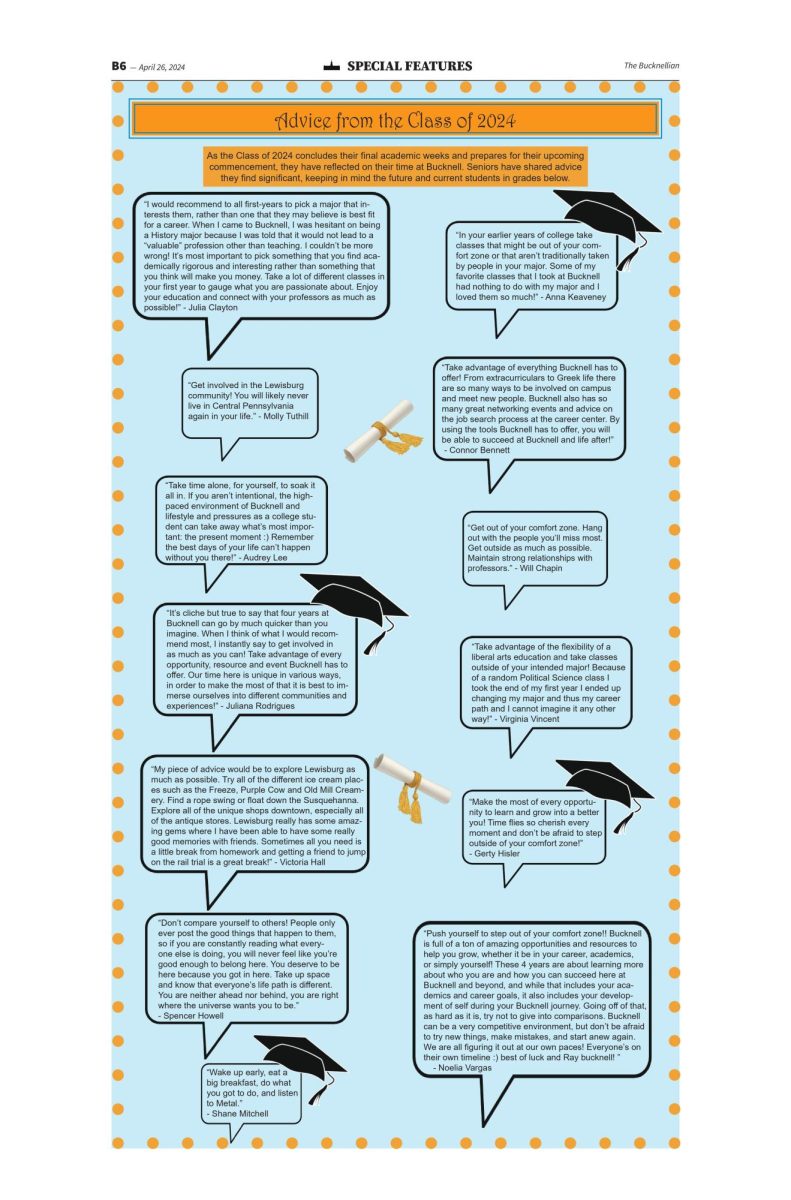EDITORIAL: Prioritizing our mental health
April 4, 2019
In her Student Lectureship talk at the University on April 2, Olympic gymnast Aly Raisman stressed the importance of self-care and taking time every day to relax and promote a positive self-image. Her message especially resonates with the college population, with many students going through a high-stress time in their lives. As students, we often stretch ourselves too thin as we commit to demanding academics, our social lives, and extracurriculars. It is easy to forget the necessity of self-care and succumb to our own negative thoughts.
A 2016 survey of students by the American College Health Association found that “52.7 percent of students surveyed reported feeling that things were hopeless and 39.1 percent reported feeling so depressed that it was difficult to function during the past 12 months.” In the 2017 Bucknell Satisfaction Survey, 75 percent of respondents said they “felt overwhelmed by academics” while 52 percent said they “felt alone,” 43 percent said they “felt depressed,” and nine percent said they “had an eating disorder.”
Considering these numbers, it is time to make mental health a priority on campus. Taking care of yourself is more important than grades, athletic performance, and social status. We pride ourselves on having an exceptionally physically healthy campus, but we must remember that mental health is a crucial component of well-being, as well. However, it often proves difficult for individuals to seek help or counseling because of the negative stigma surrounding the topic. Students are often reluctant to categorize themselves as depressed, anxious, or lonely. It is important that we recognize and strive to change the harmful perceptions surrounding mental illness.
As a University community, we must take steps towards an open conversation about mental health that will empower students to seek help when needed. We should all take it upon ourselves to check in on those close to us, keeping an eye out for any signs or changes in behavior that could be red flags for a mental health issue. Sometimes, people do not know where to begin asking for help, and the compassion and small intervention of a friend or kind stranger can go a long way.
“It’s okay to not be okay. It’s okay to ask for help,” Raisman emphasized. Her message is something we can all carry with us into our daily lives. There are resources on campus accessible to any student, and whether you are going through a crisis or simply need someone to listen, any of the resources listed below are always willing to offer support and assistance.
Counseling & Student Development Center (M-F 8:30 a.m.-4:30 p.m.): 570.577.1604 or by walk-in / After business hours: 570.577.1604
Bucknell Public Safety: 570.577.1111
Mental Health TAP Line (local community 24-hour line): 1.800.222.9016
Call the National Suicide Prevention Lifeline 24/7 (https://suicidepreventionlifeline.org) 1.800.273.8255.
Crisis Text Line (https://www.crisistextline.org) Text HOME to 741741 at any time, for any type of crisis. If you’re a person of color who is experiencing a crisis, you can also text STEVE to 741741 to connect with a trained crisis counselor of color.
Dial 911
























fitoru • Jan 12, 2020 at 7:01 pm
Thanks for sharing such a valuable article. Keep up your good work!